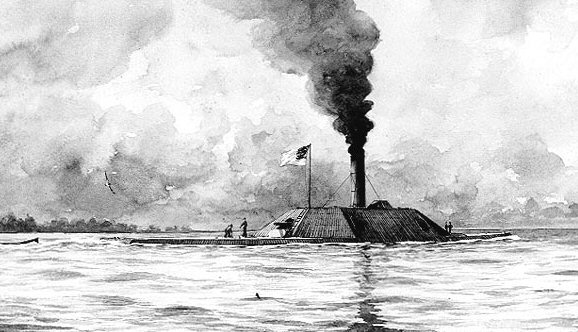James W. Cooke on:
[Wikipedia]
[Google]
[Amazon]
James Wallace Cooke (August 23, 1812 – June 21, 1869) was an American naval officer, serving in the
 Commander Cooke's next assignment was to oversee the construction of the
Commander Cooke's next assignment was to oversee the construction of the
US People
{{DEFAULTSORT:Cooke, James W. 1812 births 1869 deaths Confederate States Navy captains People from Beaufort, North Carolina United States Navy officers People of Virginia in the American Civil War
United States Navy
The United States Navy (USN) is the maritime service branch of the United States Armed Forces and one of the eight uniformed services of the United States. It is the largest and most powerful navy in the world, with the estimated tonnage ...
and during the American Civil War
The American Civil War (April 12, 1861 – May 26, 1865; also known by other names) was a civil war in the United States. It was fought between the Union ("the North") and the Confederacy ("the South"), the latter formed by states th ...
serving in the Confederate Navy
The Confederate States Navy (CSN) was the Navy, naval branch of the Confederate States Armed Forces, established by an act of the Confederate States Congress on February 21, 1861. It was responsible for Confederate naval operations during the Amer ...
.
Pre-war life
James Wallace Cooke was born inBeaufort, North Carolina
Beaufort ( ) is a town in and the county seat of Carteret County, North Carolina, Carteret County, North Carolina, United States. Established in 1713 and incorporated in 1723, Beaufort is the fourth oldest town in North Carolina (after Bath, Nor ...
, and was orphaned at the age of 4. In 1828, with the help of his uncle, he was appointed to the United States Navy as a Midshipman
A midshipman is an officer of the lowest rank, in the Royal Navy, United States Navy, and many Commonwealth navies. Commonwealth countries which use the rank include Canada (Naval Cadet), Australia, Bangladesh, Namibia, New Zealand, South Afr ...
. In May 1861, while holding the rank of Lieutenant
A lieutenant ( , ; abbreviated Lt., Lt, LT, Lieut and similar) is a commissioned officer rank in the armed forces of many nations.
The meaning of lieutenant differs in different militaries (see comparative military ranks), but it is often sub ...
, he resigned his U.S. commission.
Civil War service
At the start of the Civil War in 1861 Cooke joined theVirginia
Virginia, officially the Commonwealth of Virginia, is a state in the Mid-Atlantic and Southeastern regions of the United States, between the Atlantic Coast and the Appalachian Mountains. The geography and climate of the Commonwealth ar ...
State Navy, and entered the service of the Confederacy in the following June. Later that year he was placed in command of the small gunboat
A gunboat is a naval watercraft designed for the express purpose of carrying one or more guns to bombard coastal targets, as opposed to those military craft designed for naval warfare, or for ferrying troops or supplies.
History Pre-steam ...
CSS ''Ellis'', and was captured with her after a hard fight near Roanoke Island
Roanoke Island () is an island in Dare County, North Carolina, Dare County, bordered by the Outer Banks of North Carolina, United States. It was named after the historical Roanoke (tribe), Roanoke, a Carolina Algonquian people who inhabited the ar ...
, North Carolina on February 10, 1862. Wounded in that action and soon paroled, he was promoted to commander
Commander (commonly abbreviated as Cmdr.) is a common naval officer rank. Commander is also used as a rank or title in other formal organizations, including several police forces. In several countries this naval rank is termed frigate captain.
...
in June 1862.
 Commander Cooke's next assignment was to oversee the construction of the
Commander Cooke's next assignment was to oversee the construction of the ironclad
An ironclad is a steam engine, steam-propelled warship protected by Wrought iron, iron or steel iron armor, armor plates, constructed from 1859 to the early 1890s. The ironclad was developed as a result of the vulnerability of wooden warships ...
ram CSS ''Albemarle'', under construction at "Edward's Ferry" near modern-day Scotland Neck, North Carolina
Scotland Neck is a town in Halifax County, North Carolina, United States. According to the 2010 census, the town population was 2,059. It is part of the Roanoke Rapids, North Carolina Micropolitan Statistical Area.
History
The Hoffman-Bower ...
, from January 1863. After many difficulties, ''Albemarle'' was successfully completed in April 1864, and Cooke became her commanding officer. On April 19 and May 5, he took her into action against Federal forces, sinking one gunboat and disabling or driving off others. That June he was promoted to the rank of captain
Captain is a title, an appellative for the commanding officer of a military unit; the supreme leader of a navy ship, merchant ship, aeroplane, spacecraft, or other vessel; or the commander of a port, fire or police department, election precinct, e ...
and was later placed in charge of Confederate naval forces on North Carolina's internal waters, holding that position until the end of the Civil War in 1865.
Late life and death
James W. Cooke died atPortsmouth, Virginia
Portsmouth is an independent city in southeast Virginia and across the Elizabeth River from Norfolk. As of the 2020 census, the population was 97,915. It is part of the Hampton Roads metropolitan area.
The Norfolk Naval Shipyard and Naval M ...
in 1869, and is buried at Cedar Grove Cemetery.
References
:''This article incorporates text from thepublic domain
The public domain (PD) consists of all the creative work
A creative work is a manifestation of creative effort including fine artwork (sculpture, paintings, drawing, sketching, performance art), dance, writing (literature), filmmaking, ...
U.S. Naval Historical Center.''US People
{{DEFAULTSORT:Cooke, James W. 1812 births 1869 deaths Confederate States Navy captains People from Beaufort, North Carolina United States Navy officers People of Virginia in the American Civil War